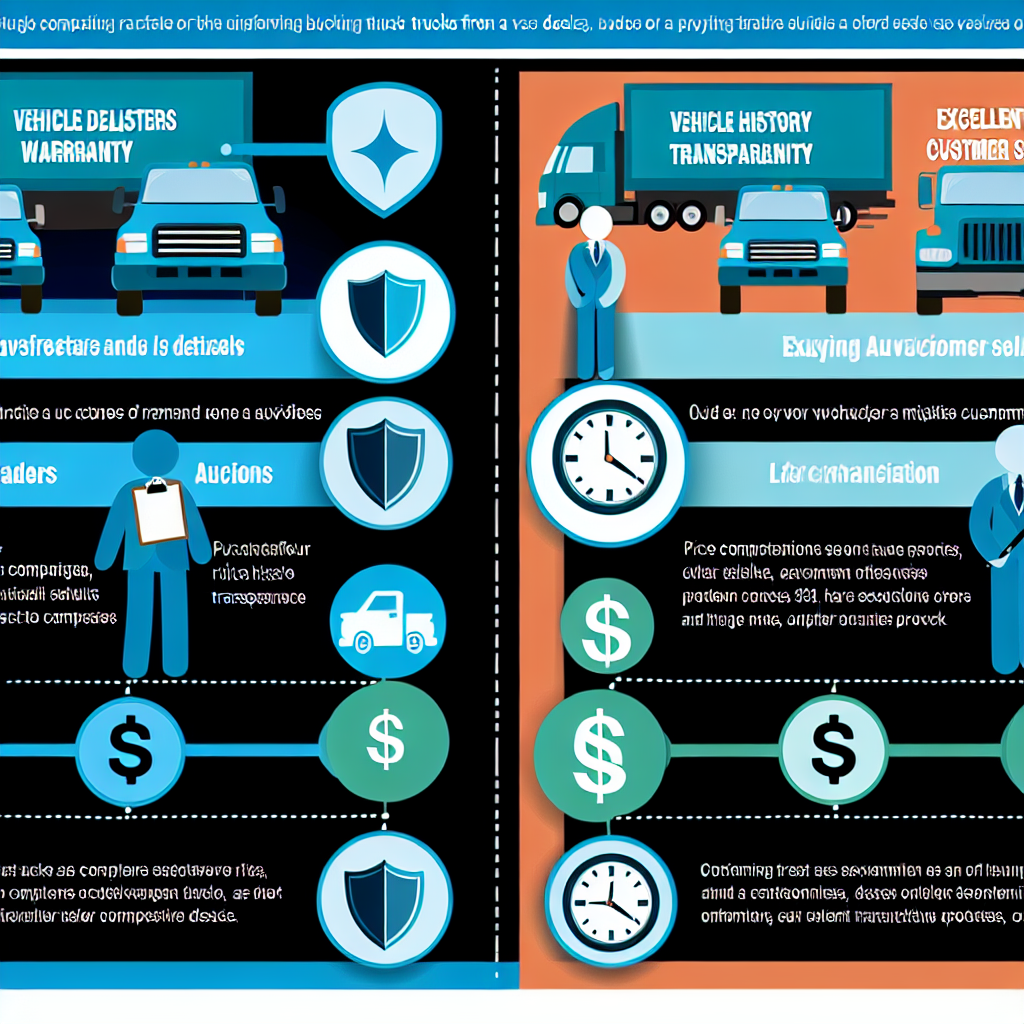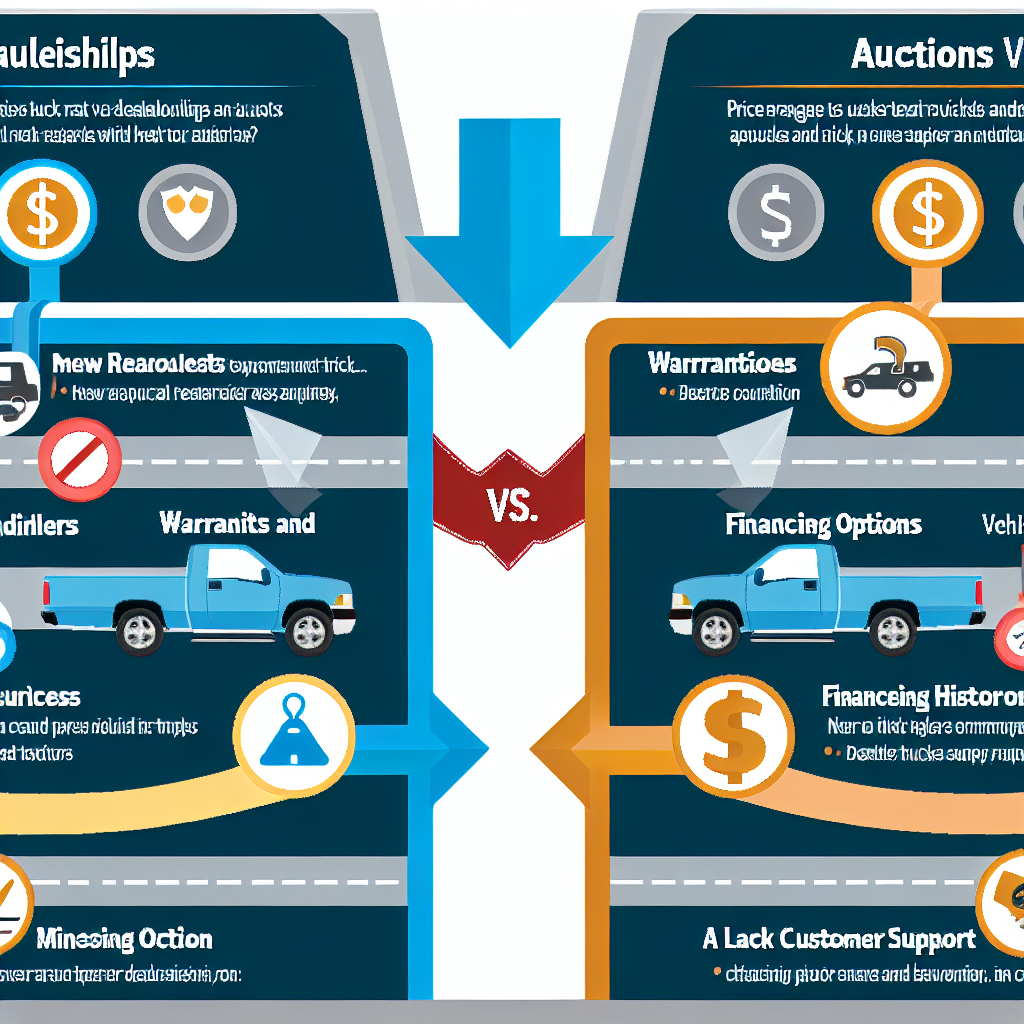When it comes to purchasing used trucks, buyers often face a crucial decision between dealer sales and auctions. Each option presents distinct advantages and serves different customer needs, making it imperative to understand their differences before committing to a purchase.
Dealer sales typically provide a more straightforward buying experience, often coming with warranties and the reassurance of dealer support. On the other hand, auctions offer a dynamic purchasing environment, where buyers might find significantly lower prices, but without the guarantees associated with dealer sales.
Understanding these differences is essential for buyers to make informed decisions and ultimately select the right vehicle that meets their operational requirements and budgetary constraints. As we explore the strengths and weaknesses of each buying method, it becomes clear that there is no one-size-fits-all solution; rather, the ideal choice hinges on the specific needs of the buyer.

Advantages of Purchasing Trucks from Dealers
Purchasing a truck from a dealer comes with numerous advantages that can greatly enhance your buying experience. Here are some of the key benefits:
- Vehicle History Transparency
Dealers often provide comprehensive vehicle history reports. These reports detail maintenance records, previous owners, and any accidents, giving buyers a clear understanding of the truck’s past. This transparency helps reduce the risk of acquiring a vehicle with hidden issues, ensuring a more informed buying decision. - Warranties and After-Sales Support
Many reputable dealers offer warranties on their trucks. This provides buyers with added peace of mind, as any unexpected repairs will be covered during the warranty period. Additionally, after-sales support is typically available, allowing customers to get assistance with maintenance or any other concerns post-purchase. On the contrary, trucks sold at auctions are usually sold “as-is,” leaving the buyer at risk for future problems. - Accessible Financing Options
Dealers usually offer a variety of financing options, partnering with multiple lenders to provide competitive rates and flexible payment plans. This simplifies the purchasing process, making it easier for buyers to find financing that suits their budget. Auctions, however, often require buyers to secure financing independently, which can add an extra layer of complexity to the buying process. - Inspection and Reconditioning
Prior to sale, dealers often conduct thorough inspections and necessary reconditioning on their vehicles. This means buyers can expect a truck that is ready for use and meets safety standards. In contrast, vehicles sold at auctions typically do not undergo such rigorous inspections, increasing the risk that the buyer may have to deal with immediate repairs. - Customer Service and Expertise
Dealerships employ knowledgeable staff who can offer expert advice, assist with vehicle selection, and answer questions throughout the buying journey. This level of customer service enhances the overall experience and provides valuable insights that can help buyers make the right choice. Auctions often lack this kind of support, requiring buyers to navigate the purchasing process largely on their own.
In summary, buying trucks from dealers offers greater transparency, better protections, and more comprehensive support than auctions, resulting in a safer and more satisfying purchase experience.
Benefits of Buying Trucks at Auction
Purchasing trucks at auction presents a range of compelling advantages that appeal to many buyers, especially those looking for cost-effective options and a diverse selection. Here are some key benefits to consider:
-
Price Competitiveness
One of the most attractive aspects of buying trucks at auction is the potential for significant savings. Auctions typically feature competitive bidding, which can lead to lower prices compared to retail markets. For instance, a buyer may attend an auction where a well-maintained Class 8 truck that retails for $40,000 is available. During bidding, the competitive nature drives the final sale price down to $33,000, creating an immediate saving of $7,000 for the buyer. -
Large Selection
Auctions offer a vast selection of trucks that can cater to any buyer’s unique needs. From heavy-duty vehicles to specialty trucks, the variety available is often impressively extensive. For example, at a typical auction, a contractor might discover a wide range of trucks, including everything from box trucks fitted for local deliveries to sleeper cabs equipped for long-haul journeys. This large selection ensures buyers can find the perfect truck that meets their operational requirements without being limited to a particular dealer’s inventory. -
Quick Transactions
Auctions are designed for speed, meaning transactions can be completed in a matter of hours. For a busy business owner, this efficiency is invaluable. Imagine a trucking company facing an urgent need for additional vehicles due to an unexpected surge in contracts. By attending an auction, the owner may successfully purchase multiple trucks in one day, allowing them to get back on the road and meet client demands swiftly. The contrast with the often lengthy negotiations and complicated processes involved in dealer transactions is significant. -
Access to Unique Trucks
Auctions often feature unique or specialized trucks that may not be available through dealers. For example, a construction firm might be looking for a specific type of flatbed truck with modifications for their unique projects. At an auction, the firm can find that very truck, which might not be part of a dealer’s general inventory. This gives buyers the opportunity to acquire specific vehicles that frequently meet niche requirements. -
Potential for Lower Buyer Competition
In some auctions, especially local or less marketed ones, buyers may find themselves facing less competition, which can further enhance the potential for bargains. For example, if a truck auction is held in a rural area, the local turnout might be lower than industry-wide events, leading to opportunities where a buyer could secure desirable trucks at lower prices due to reduced bidding activity.
In summary, buying trucks at auctions enhances the purchasing experience by providing competitive pricing, extensive selection, and quick transactions, allowing buyers to make strategic decisions to meet their business needs while potentially saving thousands.
| Feature | Dealerships | Auctions |
|---|---|---|
| Price Ranges | Higher, but more stable prices | Typically lower, variable prices due to bidding |
| Warranties | Often includes limited warranty | Sold “as-is” without warranty |
| Condition | Inspected and reconditioned | May have unknown issues, sold as seen |
| Financing Options | Offers financing through lenders | Buyers handle financing independently |
| Vehicle History | Detailed history reports available | Limited or no history available |
| Customer Support | Dedicated sales staff for assistance | Minimal assistance, more self-service |
This table highlights the key differences between purchasing trucks from dealerships versus auctions, providing potential buyers with crucial information to guide their decisions based on their individual needs and circumstances.
Current Trends in the Used-Truck Market
The used truck market, particularly for Class 8 trucks, exhibits significant growth and fluctuations influenced by various factors. For instance, in December 2023, retail sales surged by 23% month-over-month and 24% year-over-year, significantly outperforming typical seasonal increases. This boom was largely propelled by a remarkable 47% increase in auction activity during the same period. As buyers sought reliable trucks, the competition and demand grew, making auctions a key player in the market dynamics.
However, January 2024 presented a stark contrast, witnessing a sharp decline of 80% in auction sales from the previous month—a possibility driven by the seasonal adjustments and variations in inventory. Despite this volatility, the overall market remains robust, supported by improved financing options that enable buyers to navigate their purchases more effectively.
Additionally, the average age of Class 8 vehicles at auction decreased by 2% year-over-year, indicating a trend toward newer inventory being offered, which can appeal to buyers seeking quality at competitive prices. In terms of pricing, a 4% month-over-month increase in used Class 8 retail prices was noted in December 2023, underscoring a stabilization in these vehicles’ values despite a year-over-year decline of 4%.
These statistics illustrate a dynamic market where both retail and auction venues play critical roles, providing potential buyers with options that meet their needs while grappling with the ever-changing landscape of the used truck industry.
Buyer Experiences: Trust and Satisfaction in Dealerships vs. Auctions
When it comes to acquiring a used truck, buyers often find themselves weighing the choices between purchasing from a dealership or an auction. Each route presents distinct buyer experiences that cater to varying needs and preferences, ultimately reflecting the trust and satisfaction buyers derive from their decisions.
Purchasing a truck from a dealership typically aligns with buyers seeking professionalism and support. Industry expert Steve Tam highlights this trend, stating,
“The majority of the increased volume came in the auction and wholesale channels,” which underscores how dealerships are pivotal in providing a stable purchasing environment for those who prefer reliability in their investment.
Dealerships offer the reassurance of warranties, comprehensive vehicle inspections, and dedicated customer service, which can significantly enhance buyer confidence. A satisfied buyer might articulate, “Knowing I have a warranty gives me peace of mind; I can focus on my business without worrying about unexpected repairs.” This level of after-sales support is crucial for those looking to mitigate risk.
On the other hand, auctions create a thrilling purchasing atmosphere that appeals to buyers searching for value through competitive pricing. Tam observed that equipment scarcity often drives buyers toward auctions, emphasizing a vibrant bidding environment. In this context, buyers frequently experience euphoria in discovering a quality truck at a great price. For example, many buyers have shared,
“At the auction, I found a truck I thought I could never afford; the competition brought the price down significantly, and it felt like a win!”
This sentiment reflects the excitement auctions generate, where buyers can succeed in negotiating lower prices than those typically available through dealerships.
Furthermore, auctions often showcase a diverse array of vehicle types that might not be available at a dealership, allowing buyers to find unique models tailored to specific business needs. Factors such as swift transactions and the allure of potentially lower prices bolster the appeal of this option.
Ultimately, whether buyers choose the more structured environment of a dealership or the exhilarating world of auctions, both pathways offer unique advantages that foster buyer satisfaction. As Tam notes about the market’s dynamics, “if you go anywhere you could get [the equipment].” Thus, buyers can feel secure in their choice as they navigate the professional expertise of a dealership or the competitive pricing of an auction setting. Trust and satisfaction remain key takeaways for buyers, reinforcing the idea that there is no definitive right choice; instead, it’s about aligning their decision with their unique needs.
Conclusion
In conclusion, the choice between purchasing a used truck from a dealer or an auction hinges on individual needs, preferences, and circumstances. While dealer sales offer benefits such as transparency, warranties, and customer support, auctions present the thrilling possibility of competitive prices and diverse selections. Each option carries its own unique set of advantages that can greatly impact your purchasing experience.
Ultimately, your best approach is to carefully evaluate what is most important to you. Are you searching for peace of mind in warranties and support, or are potential savings and quick transactions your top priorities? By reflecting on your specific requirements, you can confidently navigate the diverse landscape of used truck sales.
Additionally, do not hesitate to seek further information, whether it be through industry resources, trusted advisors, or forums where fellow buyers share their experiences. The more informed you are, the better equipped you will be to make a decision that aligns with your operational needs and budget. Take charge of your truck buying journey and remember, the right selection can make all the difference in driving your business forward!

Frequently Asked Questions (FAQ)
- What is the quality of trucks purchased at auctions compared to dealerships?
While dealerships typically offer inspected and reconditioned trucks with a guaranteed history, trucks sold at auctions are often sold “as-is.” This means that buyers should be cautious as they might not have complete information about the vehicle’s condition. It is advisable to do thorough research or inspections when considering an auction purchase. - How does the purchasing process differ between dealers and auctions?
Buying from a dealer usually involves a straightforward process with customer service support, financing options, and warranties. In contrast, auctions tend to be faster-paced, focused on bidding, and often lack post-sale support, which may require buyers to conduct more independent research and be prepared for a less structured process. - Are the prices at auctions typically lower than those at dealerships?
Generally, yes. Auctions can offer lower prices due to the competitive bidding environment. Buyers might be able to secure trucks at a significant discount compared to retail prices offered at dealerships. However, prices can vary widely based on the demand and condition of the vehicles. - What about warranties when buying from auctions?
Trucks purchased at auctions are generally sold without warranties, leaving buyers with the responsibility for any necessary repairs after the sale. In contrast, many dealerships provide warranties which can offer peace of mind against unexpected repairs. - How can I ensure I am making a wise purchase at an auction?
Prospective buyers should conduct thorough research on the types of trucks they are interested in, understand the auction process, and, if possible, have a trusted mechanic inspect the trucks beforehand. Familiarizing oneself with auction trends and market values will help in making an informed decision. - Is financing easier with a dealer or at auction?
Financing options are typically more accessible through dealerships, which often have partnerships with lenders. Auctions generally require buyers to secure their own financing beforehand, which can complicate the buying process. - What are some essential truck buying tips for heavy-duty trucks?
When looking to purchase heavy-duty trucks, consider these tips:- Evaluate the truck’s payload capacity and engine performance to ensure it meets your operational requirements.
- Check the maintenance records and previous ownership history to gauge its reliability and upkeep.
- Consider the resale value; choosing a truck from a reputable brand can enhance future trade-in options.
- Always conduct a thorough inspection or enlist a professional mechanic before finalizing your purchase, whether from a dealer or auction.
In conclusion, buyers should weigh their priorities carefully when choosing between purchasing from dealers or auctions, considering factors like quality, pricing, and post-purchase support based on their unique needs.
Visual Representation: Comparing Dealer Sales and Auctions
To provide readers with a clearer understanding of the benefits and characteristics of purchasing trucks from dealers versus auction sales, the following infographics illustrate key comparisons:

A visual comparison of the advantages of purchasing trucks from dealers against the benefits of buying trucks at auctions.

A visual representation showing the key features comparison between purchasing trucks from dealerships and auctions.
Enhancing Emotional Engagement with Statistics and Case Studies
Incorporating statistics and case studies into the sections about dealer and auction benefits adds depth and emotional engagement for readers. Here are some relevant findings that enrich our discussion:
Statistics
- Strong Market Growth: In December 2024, same-dealer retail sales for used Class 8 trucks surged by 23% month-over-month and 24% year-over-year as buyers rushed to secure trucks ahead of anticipated value hikes. This highlights the attractiveness and competitiveness of the dealer market. Source
- Auction Activity: December 2024 auction sales increased by 47% month-over-month, illustrating the auction market’s dynamic nature, where savvy buyers can find deals. Conversely, January 2025 saw a drop of 80% in auction sales, emphasizing the variability of this buying method. Source
- Purchasing Experience Satisfaction: According to J.D. Power’s 2024 SSI Study, customer satisfaction with the vehicle purchasing process has reached an impressive score of 801 out of 1,000, improving from previous years. This satisfaction reflects the positive impact of dealership support and the overall motor vehicle purchasing experience. Source
Case Studies
- In February 2025, an online auction by Tiger Group showcased several 2024 Freightliner Cascadia sleeper trucks selling for over $140,000 each, reflecting the potential high-value opportunities available at auctions. Source
- A 2017 article highlighted numerous advantages for dealers who utilize auctions, such as faster turnover for trucks and larger inventory access, ultimately leading to a broader selection for buyers. Source
Each of these data points serves to illustrate not only the vibrancy of the used truck market but also the unique advantages associated with purchasing from dealers and at auctions. By emphasizing this data, we can create a more engaging narrative that resonates with potential buyers.
Additional Resources for Truck Purchasing and Maintenance
To further enhance your understanding of truck purchasing, maintenance, and financing options, consider exploring the following authoritative sources:
- Phillips Buick GMC: Insights on inspecting service records and ensuring reliability when buying a used truck.
- Upper Marlboro Ford: Guidance on pre-purchase inspections and assessing vehicle condition.
- Consumer Reports: A comprehensive comparison of new and used trucks featuring considerations for reliability and depreciation.
- Edmunds: Detailed buying guides focusing on various truck types and their suitability for different needs.
- AutoNation: Factors to consider when buying a used truck, including towing capacity and service records.
- Overdrive Magazine: Tips for buying a used truck, emphasizing thorough research and inspections.
Exploring these links will provide you with valuable insights to support your truck purchasing journey, ensuring you’re well-informed and prepared.
Additionally, consider these best practices for truck maintenance:
- Regular Fluid Changes: Perform regular oil changes every 5,000 to 7,500 miles, changing oil filters simultaneously whenever applicable.
- Tire Maintenance: Inspect tires for uneven wear, and measure tread depth regularly. Conduct tire rotations to extend lifespan.
- Brake System Checks: Regularly check brake pads, rotors, and lines for wear; address any concerns immediately.
- Battery Maintenance: Clean battery terminals, monitor charge levels, and replace batteries every three to five years.
- Seasonal Maintenance: Adjust maintenance practices based on seasonal conditions, ensuring your truck performs optimally throughout the year.
Understanding these best practices and obtaining information from trusted sources will prepare you for informed truck purchasing and maintenance decisions.
Simplified Sentences for Enhanced Readability
- “When purchasing used trucks, buyers must decide between dealer sales and auctions.”
- “Each choice has its own advantages and caters to different customer needs, so understanding the differences is important before making a purchase.”
- “Dealer sales offer a clear buying process, usually with warranties and dealer support.”
- “Auctions provide a lively buying environment where buyers may find lower prices, but these come without the guarantees of dealer sales.”
- “Knowing these differences helps buyers make informed choices and find the right vehicle to meet their needs and budget.”
- “As we look at the strengths and weaknesses of both buying methods, it is clear there is no perfect solution; the best choice depends on the buyer’s specific needs.”
These changes aim to enhance clarity and engagement for readers, making the article more accessible and informative without losing its original message.


